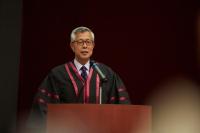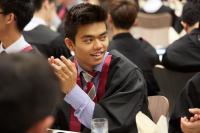Mr Lee had majored in history at CUHK, and was a member of the University's basketball team. It so happened that the coach was also an instructor for the police team, and CUHK players including Mr Lee had the chance to play with the police team from time to time. It was through this connection that he was drawn to the community of police officers, and thus he became a probationary inspector soon after graduation. Senior members of the force had advised him as a young inspector to keep a certain distance from his subordinates, in order to maintain a superior stature that would ensure respect and compliance with commands; he thought otherwise.
After several months' training, he was assigned to a police station, and took command of a small team of 40. He took the time to get to know his team: their family backgrounds, personal interests, strengths and weaknesses; he would talk to them regularly. It was only after he got to know the team as people that he could win their support for his expectations on behaviour and discipline, and that he would be able to train them to complete the tasks required.
Mutual Trust
Even when he was promoted to management ranks, he would try to find time to meet and talk with frontline staff, to show his support. He would meet members of the police force where they worked; he would join activities and gatherings, to interact and to listen. He would try to understand police work from the perspective of officers on the beat, as input to formulating management strategies.
Team Spirit
Building a team spirit and strong morale are essential for leadership. Mr Lee said, 'It is like basketball: the team members have to support each other, and the captain has to take care of team members and motivate them to win the game. A leader has to make colleagues happy to work for you. Your teammates have to take breaks and eat first, no matter how tired or hungry you may be yourself. Regular communication with your staff is vital, so that they would feel free to speak about difficulties they face; that would help them relieve their stress on the job and help you as the leader to understand their situation at work. The same applies when managing the hundreds of senior staff.'
Allocation and Delegation
'Even a superman cannot do everything single-handedly by himself. A leader must learn to allocate work and delegate, in an appropriate and proper manner,' said Mr Lee. He would delegate, teach subordinate problem-solving skills, and monitor progress.
Vision, goals and Lifelong Learning
A good leader must have an inspiring vision and clear goals, and ensure that the whole team shares these goals. A leader must keep learning and drawing lessons from experience, or else there is the danger of being overtaken or even rendered useless.
Mr Lee closed by encouraging students to study and equip themselves, and to one day become outstanding leaders for the community.























